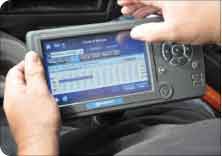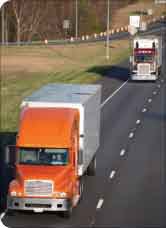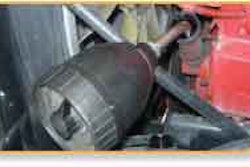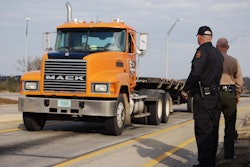Cross-border plan unveiled
U.S. Transportation Secretary Ray LaHood on Jan. 6 provided Congress and Mexico with a proposal for a long-haul cross-border Mexican trucking program. He says it emphasizes safety and satisfies the United States’ obligations under the North American Free Trade Agreement.
 Trucks cross the World Trade Bridge over the Rio Grande in Laredo, Texas. An informal proposal from the U.S. Department of Transportation would require safety inspections and ongoing reviews for Mexican carriers that want to operate in the U.S.
Trucks cross the World Trade Bridge over the Rio Grande in Laredo, Texas. An informal proposal from the U.S. Department of Transportation would require safety inspections and ongoing reviews for Mexican carriers that want to operate in the U.S.The proposal outlines the steps Mexican carriers would have to take, including a comprehensive safety audit and vetting process, before being granted access to operate in the U.S. Carriers that would be phased in to the program would undergo several inspections and reviews to monitor their continued safe operation in the U.S.
Bill Graves, American Trucking Associations president and CEO, said the U.S. announcement “is a positive development in resolving this costly trade dispute with Mexico.” Todd Spencer, executive vice-president of the Owner-Operator Independent Drivers Association, however, said it would rob American truckers of jobs and that Mexico lacks U.S. regulatory standards.
After a pilot program was terminated in March 2009, Mexico responded by placing tariffs on U.S. products.
After the ban in 2009, LaHood and other Obama Administration officials met with lawmakers, safety advocates, industry representatives and other stakeholders to address concerns. The DOT says the recent proposal addresses questions raised during that process.

Mexico’s economic secretary Bruno Ferrari said his nation is seeking a permanent cross-border trucking agreement. Jose Luis Paz Vega, who heads Mexico’s trade and NAFTA office in Washington D.C., said Mexico was unwilling to accept another pilot project, according to a November Congressional report.
The DOT says a formal proposal will follow a public comment period.
— Jeff Crissey and Jill Dunn
Dart buys Fil-Mor assets
Immediately after Fil-Mor Express unexpectedly closed Dec. 17, Dart Network began recruiting its competitor’s former drivers and on Dec. 21 announced it had bought its assets.
Dart’s leasing company, Highway Sales, bought Fil-Mor’s 153 daycabs and a portion of its trailer fleet. Dartco, an employee-driver fleet that contracts its trucks and drivers to Dart, is recruiting Fil-Mor’s 200 employee drivers.
Dart had announced it would match Fil-Mor’s mileage rate and its former drivers would drive for the same customers at Dart. Dart also offered positions to Fil-Mor’s office staff. Fil-Mor and Dart are dry van truckload carriers located 45 miles apart in Minnesota, and have operated in many of the same freight corridors.
Richard Olson, Fil-Mor president and CEO, issued a Dec. 16 e-mail saying the business and benefits would end the next day, according to a Dec. 29 story in Rochester’s The Post-Bulletin.
– Jill Dunn
SHORT HAULS
WEBSITE CORRECTION. The web address of factor company Seven Oaks Capital Management was incorrectly listed in the December story on factoring. Find the firm at www.sevenoakscapital.com.
DIESEL WILL COST 41 cents more on average during 2011 than it did during 2010, according to the latest forecast from the U.S. Department of Energy’s Energy Information Administration. In 2010, the average on-highway retail diesel price was $2.99. EIA expects that to rise to $3.40 in 2011 and $3.52 in 2012.
NET ORDERS OF CLASS 8
Trucks for North American markets surged in December, based on research by ACT Research Co. and FTR Associates. Both firms pegged the December count at more than 25,000 units. ACT said the figure was more than double the total in December 2009. FTR projected the annualized orders at 280,000 units, based on fourth quarter activity.
Trucking groups back port appeal
Four organizations have filed briefs supporting the American Trucking Associations’ appeal against the Port of Los Angeles over the port’s concession agreement.
The Owner-Operator Independent Drivers Association, Intermodal Association of North America, National Right to Work Legal Defense Foundation and the Center for Constitutional Jurisprudence, which filed jointly with the Harbor Trucking Association, filed amicus briefs.
The foundation provides free legal aid to employees whose rights have been violated by compulsory unionism, while the center is a public interest law firm. HTA is a coalition of Los Angeles and Long Beach intermodal carriers.
The port’s response brief was due Jan. 31 and ATA’s optional reply is due Feb. 14, with the court expected to schedule oral arguments soon after that.
On Aug. 26, the U.S. District Court for Central California found in favor of the port regarding the agreement it requires carriers to sign to do business with the entity. The most contentious issue was the port’s ban on owner-operators from regularly serving the port, requiring instead that they be carrier employees.
That ruling said the port’s requirements were protected from federal preemption because it was acting as a private market participant, which is immune from preemption.
If it had been acting as a governmental regulator, it would have to adhere to federal preemption.
Owner-operators would be driven out of business by the port’s regulations and the application of the market participant exception would give the port free reign to interfere with virtually every aspect of the international commerce moving through it, the amicus briefs contend.
OOIDA wrote that the lower court “based certain findings about the nature of owner-operators’ businesses and safety practices on unfounded and irrelevant trial testimony.”
ATA argued the port is not acting as a market participant because it neither buys nor sells drayage services. Further, the port’s disputed actions, including promoting economic development and clean air, traditionally are those of a government entity and not of a private party.
– Jill Dunn
DOT updates rules timetable
The Federal Motor Carrier Safety Administration indicates a final rule for entry-level minimum driver training will be published by December.
 One of the pending rulemakings involves carriers required to use electronic onboard recorders.
One of the pending rulemakings involves carriers required to use electronic onboard recorders.The U.S. Department of Transportation updates the status of pending rulemaking at the start of each month with its significant rulemaking report, but the report does not commit the agency to conclusions or actions.
The entry level driver training final rule, scheduled for publication last February, will be published Nov. 25. The agency found it needed additional coordination and discovered unanticipated impacts needing further study, which delayed publication
This rule would require behind-the-wheel and classroom training for entry-level CDL holders to operate commercial motor vehicles. A previous final rule was remanded to the FMCSA five years ago by a federal appeals court. In 2008, the agency ended its extended comment period regarding the subsequent notice of proposed rulemaking.
A final rule is expected Feb. 28 for CDL testing and Commercial Learner’s Permit standards, a year later than scheduled. The extended comment period on the related NPRM ended in 2008.
This rulemaking would revise CDL knowledge and skills testing standards, decrease fraud at state licensing agencies and set new minimum standards for states to issue CLP, in response to federal statutes.
The agency set a June 7 supplemental NPRM publication date for replacing the current identification and registration systems with the United Registration System. The Single State Registration System replacement, which the ICC Termination Act directed be merged under URS, and the cargo insurance requirement have been addressed in previous final rules.
The rulemaking schedule also included:
• A Jan. 28 NPRM publication date for revisions regarding expanding the number of carriers required to use electronic onboard recorders, consolidated with the hours of service supporting documents for drivers.
• A July 10 publication date for a NPRM revising the Carrier Safety Fitness Determination, in accordance with the Compliance, Safety, Accountability program.
• A 2012 publication of NPRM amending a rule to allow drivers with insulin-treated diabetes to drive a truck without requiring a FMCSA exemption.
— Jill Dunn
Speed limiter rule to be considered in 2012
More than four years after the trucking industry asked the federal government to mandate speed limiters on new heavy-duty trucks, the National Highway Traffic Safety Administration announced it will launch a rulemaking on the issue in 2012.
 Two petitions propose installing devices that would cap truck speeds at 68 mph.
Two petitions propose installing devices that would cap truck speeds at 68 mph.In August, senior officials of NHTSA and the Federal Motor Carrier Safety Administration told proponents of speed limiters they anticipated making a formal decision on launching a rulemaking by the end of 2010.
According to a notice published in the Federal Register, NHTSA is granting two separate petitions for rulemaking filed in 2006 — one by the American Trucking Associations and the other by safety group Road Safe America along with nine trucking companies — Schneider National, C.R. England, H.O. Wolding, ATS Intermodal, Dart Transit, J.B. Hunt, U.S. Xpress, Covenant Transport and Jet Express.
Both petitions proposed installation of devices on new trucks that would limit top speed to 68 mph on trucks with gross vehicle weight ratings (GVWR) greater than 26,000 pounds. The major difference between the petitions is that Road Safe America and its nine carrier allies also want speed limiters mandated on all trucks built after 1990.
The Owner-Operator Independent Drivers Association is opposed, however. “Speed limiting a truck at 68 miles per hour, or at any other speed, will not improve highway safety,” said Todd Spencer, executive vice president.
A study by the University of Arkansas showed that speed limit differences between trucks and cars create more dangerous interactions, OOIDA noted in a news release. Also, a study by the University of Michigan Transportation Research Institute shows that speed-limited trucks are overrepresented in rear-end fatalities involving large trucks. Only 4 percent of all trucks are speed limited, yet half of the rear-end fatalities involving trucks were with speed-limited trucks, the association says.
NHTSA’s notice granting the petitions does not explain why it won’t begin the rulemaking for more than a year. The notice does mention, however, that NHTSA expects FMCSA to publish findings of a study on the safety impact and associated economic benefits of speed limiters in commercial vehicles.
More information on the petitions for rulemaking and comments on those petitions are available at www.regulations.gov by searching NHTSA-2007-26851.
– Avery Vise
Speeding tops safety violations
The top three reasons warnings and citations were issued to both commercial and non-commercial drivers include speeding, failing to use a safety belt and failure to obey traffic control devices, according to the Commercial Vehicle Safety Alliance’s Operation Safe Driver campaign.
Of the warnings issued to commercial drivers, 20.3 percent were for speeding (versus 61.2 percent for passenger car drivers); 4.2 percent were for failure to obey traffic control devices (5.8 percent for passenger car drivers); and, 2.6 percent were for failing to use a seat belt while operating their vehicle (2.8 percent for passenger car counterparts).
Citations issued to commercial drivers followed a similar trend, with 13.7 percent for speeding, 4.6 percent for failure to obey traffic control devices and 10 percent for failing to use a seat belt while operating their vehicle. Commercial drivers were issued significantly more warnings and citations in 2010 for failing to buckle up (1,055) versus in 2009 (672).
The fourth annual Operation Safe Driver took place Oct. 17-23.
– Jeff Crissey
CARB alters truck rules
The California Air Resources Board modified regulations related to on- and off-road diesel engines – in most cases to grant relief to financially challenged industries such as trucking and construction.
In the case of the port truck regulation, however, the board made existing rules somewhat more stringent, mirroring action taken recently by the Los Angeles Harbor Commission.
In a separate action, the board changed several aspects of regulations aimed at reducing greenhouse gases by requiring that certain long-haul operators adopt various fuel-saving technologies.
The diesel engine changes follow 20 public workshops held by CARB staff over the past year to solicit stakeholder input and discuss options for revising diesel control measures affecting commercially owned trucks, buses, port trucks, tractor trailers and off-road vehicles, including construction and large-spark ignition equipment. In addition, changes in off-road rules follow a negotiated settlement between CARB and the Associated General Contractors.
In regulations covering on-road trucks, the agency reduced overall compliance costs by about 60 percent for phasing out pre-2010 diesel engines. The agency also delayed the initial compliance date for the retrofitting of heavier trucks and allowed them to operate another eight years before being required to use a truck that meets 2010 emissions standards. CARB also expanded credits for fleet downsizing, adding cleaner vehicles ahead of any regulatory requirements, and for installation of early retrofits.
– Staff reports
SHORT HAULS
TRUCK TONNAGE in the American Trucking Associations’ advance seasonally adjusted For-Hire Truck Tonnage Index edged 0.1 percent lower in November after increasing a revised 0.9 percent in October.
TRUCKING COMPANIES added 2,600 new employees on a seasonally adjusted basis in December on top of an upward revision in the November estimate. The U.S. Department of Labor’s Bureau of Labor Statistics added 3,000 jobs to its initial November figures, so the number of trucking jobs reported for December actually is 5,600 higher than what BLS reported for November previously.
America’s Road Team named
The American Trucking Associations Jan. 12 announced captains of the 2011-2012 America’s Road Team. The million-mile, accident-free drivers will spend two years representing the industry and delivering its safety message to the community, news media and public officials.
The captains are Willie Atkinson and Danny Fuller of Con-way Freight; Gary G. Babbitt of Central Freight Lines; Joe Allen Boyd and Kenny Lowry of Wal-Mart Transportation; David Boyer, Nate McCarty and Tim McElwaney of ABF Freight System; Randall Dee Briggs and Alphonso Lewis of YRC; Samuel Douglas Lee of Old Dominion Freight Line; Dennis Martin and Roger L. Nicholson UPS Freight; J.W. Ray of Werner Enterprises; Dion Saiz and Brooks Washburn of FedEx Freight; Jeffrey Wade of Southeastern Freight Line; and Robert L. Weller of Hahn Transportation.
– Staff reports
Firm charged with defrauding truckers
The operator of South St. Paul, Minn.-based trucking companies Danner Inc. and Bull Dog Leasing Inc. was indicted Dec. 22 in federal court in Minneapolis for allegedly defrauding contracted truck drivers. He is charged with getting drivers to return to him funds related to settlement between the operator and the Minnesota Department of Transportation over underpayment of drivers used in a federally funded highway project.
Marlon Louis Danner of Inver Grove Heights was charged with six counts of wire fraud, four counts of mail fraud and one count of making a false statement. The indictment alleges that from February through June 2010, Danner operated a scheme to reclaim money he agreed to distribute to truck drivers as part of the settlement.
An investigation found Danner had failed to pay the mandated rate in 2008 and 2009 on a federally funded project. In February 2010, MnDOT and Danner reached a settlement under which Danner agreed to pay more than $185,000 to approximately 27 drivers. Danner provided the checks to MnDOT, which mailed them to the drivers in early March.
Danner allegedly called many drivers in late February, instructing them to return the settlement funds to him on the grounds that MnDOT was incorrect in concluding they were underpaid. Drivers contacting Danner’s office regarding how to return the funds allegedly were told to make payments to various companies controlled by Danner.
– Staff reports
SHORT HAULS
CLASS 7 RIGS were added to the Port of Long Beach’s Clean Trucks Program. The Long Beach Harbor Commission also decided to penalize trucking companies that switch cargo between trucks outside port terminals. The Port of Los Angeles adopted similar measures previously. Under the Clean Trucks Program, Class 8 trucks are subject to strict emissions standards, and older models have been banned progressively from terminals since the program began in 2008.
COMMERCIAL TRAILER net orders of 21,314 units in November increased 23 percent over October, which was the strongest month in more than two years, ACT Research Co. said. November net orders more than tripled from the same month last year.
NOVEMBER FREIGHT as measured by the Freight Transportation Services Index fell 0.3 percent from October, after increasing the two previous months, the U.S. Department of Transportation’s Bureau of Transportation Statistics reported. BTS reported the Freight TSI has increased in 14 of the last 18 months. Through the first 11 months of 2010, the index declined 1 percent.
SURFACE TRANSPORTATION trade between the United States and Canada and Mexico in October increased 15 percent over October 2009, hitting $70.6 billion, according to the U.S. Department of Transportation’s Bureau of Transportation Statistics. U.S.-Canada surface transportation trade totaled $40.7 billion, up 12 percent from a year earlier. U.S.-Mexico surface transportation trade totaled $29.9 billion, up 19 percent from October 2009.
TEAM DRIVERS Dave Woodman and Tony Rheault of N. Yanke Transfer, Saskatoon, Saskatchewan, have been named Highway Angels by the Truckload Carriers Association for their help at the scene of an Aug. 24 accident in Ontario. Woodman directed traffic away from the crash site and Rheault helped get a passenger out of a wrecked car and assisted a nurse in treating the driver.
Court OKs Swift chargeback fees
Swift Transportation is not required to disclose the precise amount of its chargebacks to owner-operators that represent markups or administrative fees as opposed to actual costs, a federal appeals court confirmed Jan. 20.
Based on litigation by the Owner-Operator Independent Drivers Association, Swift changed its lease agreements in 2008 to disclose that chargebacks would include certain administrative costs and other fees such as “the cost of the fuel, taxes, other government fees and charges, delivery/freight costs and administrative expenses.” Afterward, Swift’s settlement statements then listed those items but did not disclose what portion of that price is attributed to costs and what portion is profit, administrative fees or other charges.
The district court had accepted Swift’s revised chargeback provisions, but OOIDA appealed to the U.S. Court of Appeals for the Ninth Circuit. The appeals court upheld the lower court’s decision, citing, among other things, a decision by the U.S. Court of Appeals for the Eleventh Circuit in litigation between OOIDA and Landstar System. That court reasoned that if carriers charged a flat fee, no further disclosure of how a price is to be determined is necessary. If carriers charged a variable rate, the regulation requires a clear disclosure of how the price will be calculated.
The Ninth Circuit, however, declined to declare that all variable-rate chargebacks required disclosure of the amount of carriers’ profits and costs. Instead, a carrier could identify some fixed point or formula that would allow the lessor to calculate his price without revealing how much of the markup contained profits versus other expenses, the court said.
– Staff reports
TCA names fleet safety contestants
Eighteen companies will compete for two grand prizes in the Truckload Carriers Association’s 35th annual National Fleet Safety Awards.
The top three top winners in six divisions are based on accident frequency per million miles driven.
The division and grand prize winners will be honored during the annual TCA annual meeting March 13-16.
Winning companies, listed in the order they placed, are:
Less than 5 million miles: Art Pape Transfer, Dubuque, Iowa; Excargo Services, Houston; and Five Star Trucking, Willoughby, Ohio.
5 million to less than 15 million miles: Brian Kurtz Trucking, Breslau, Ontario; Stagecoach Cartage & Distribution, El Paso, Texas; and Diamond Transportation System, Racine, Wis.
15 million to less than 25 million miles: Mackinnon Transport, Guelph, Ontario; D&D Sexton, Carthage, Mo.; and Convoy Systems, Kansas City, Kan.
25 million to less than 50 million miles: Kennesaw Transportation, White, Ga.; Sunrise Express, Grand Island, Neb.; and Transport Designs, Burnsville, Minn.
50 million to less than 100 million miles: Carter Express, Anderson, Ind.; Groupe Robert, Boucherville, Québec; and Hogan Transports, St. Louis.
100 million or more miles: Bison Transport, Winnipeg, Manitoba; Gordon Trucking, Pacific, Wash.; and Roehl Transport, Marshfield, Wis.
– Jill Dunn
HIGHWAY HAPPENINGS
ARIZONA. Expect periodic lane closures as the state widens I-10 to five lanes in each direction in the West Valley area near Phoenix, between Loop 101 and Sarival Avenue. Work on a Loop 303 interchange with I-10 is scheduled to begin this spring.
ILLINOIS. The Department of Transportation closed the U.S. 60/62 bridge over the Mississippi River to all traffic. The 1920s-era bridge was restricted to a 15-ton limit, but too many violators forced the state to close the structure for repairs. The department recommends using I-57 to cross the river south of Cairo, Ill.
INDIANA. A bill introduced in the state house would permit heavy trucks to travel on a Chicago-area highway. HB1137 would allow extra-heavy-duty loads on State Route 912 in East Chicago. The state redesigned the road across a bridge to handle 134,000-pound Michigan train-permitted loads.
MISSOURI. Three rest areas on Interstates 70 and 44 are closed for repairs and no estimates have been given for reopening them, the Missouri Department of Transportation says. Closed are rest areas at I-70 eastbound at mile marker 168 near Mineola and I-44 eastbound and westbound at mile marker 52 near Halltown. No parking is available during construction.
NEW YORK. New York City’s Metropolitan Transportation Authority hiked tolls on its seven bridges and two tunnels. A five-axle truck pays $47.26 if using E-ZPass and $70 if paying cash for crossing the Verrazano-Narrows Bridge, compared to $45 and $60, respectively, before the hike. To get the city’s E-ZPass, call (800) 333-TOLL or visit www.ezpassny.com.
OHIO. Ohio Turnpike’s Mahoning Valley and Glacier Hills service plazas, near milepost 237, are closed for reconstruction and will reopen summer 2012. Until then, drivers leaving the last Pennsylvania service plaza will have 120 miles before arriving at Ohio’s first service facility. Eastbound Ohio Turnpike travelers will have 94 miles between the last service plaza in Ohio and the first service facility in Pennsylvania.
OREGON. The state raised its diesel fuel tax to 30 cents a gallon in October, pushing the total to 55.4 to 57.4 cents a gallon, depending on where the purchase is made.
PENNSYLVANIA. Turnpike tolls have increased. E-ZPass customers are paying 3 percent more in 2011, while cash customers face a 10 percent increase. The fare schedule will not be printed on tickets until the turnpike authority receives the new tickets this spring. E-ZPass tags are available at www.paturnpike.com or by calling (877) PENN-PASS. They are also sold at some grocery chains.
VIRGINIA. Work is over halfway complete on the Capital Beltway HOT Lanes project, which will replace every interchange or overpass bridge over the Beltway. The project is scheduled to be finished by late 2012.
WEST VIRGINIA. The Parkways Authority proposes tolls for a 14-mile portion of four-lane U.S. 35 in Mason and Putnam counties. Truckers paying cash would be charged $8.50 at each of two plazas, or $17 for a full-length trip. E-ZPass account holders would pay $8.08 for fixed axles at each plaza, or $16.16 for a full trip. Tolls would rise every four years through the proposed sunset date of 2043, up to $32 for a full-length trip.
U.S Xpress expects industry rebound
U.S. Xpress executives, speaking during an event at the Chattanooga, Tenn., headquarters marking the company’s 25th anniversary, said they are optimistic the trucking industry will gain momentum in the next few years.
The trucking climate “stinks,” said U.S. Xpress Co-chairman Max Fuller, borrowing language from Bill Strauss, an economist of the Federal Reserve Bank of Chicago. With gross domestic product at 3.2 percent, “you’d think that business would feel a lot better,” he said. “The reason it doesn’t feel better right now is the inventory rebuild component that has really affected the economy.”
Subtract that component, and the GDP is really running at about 1 percent, he said. Using Strauss’ forecast, the GDP should hit 4 percent in the second quarter, and confidence will improve.
“At 4 percent, the consumer will kick in, businesses will kick in and we’ll start consuming some of this inventory that has built up,” Fuller said. For 2011 and 2012, “business is going to be extremely good.”
Fuller and Co-chairman Patrick Quinn said issues such as the federal Compliance Safety Accountability program, rising fuel prices, increases in new truck prices, driver shortages and wages will challenge fleets to grow. Quinn said CSA will make it especially tough to fill driver seats.
“The capacity issue will make for some tight spots and interesting situations,” Quinn said. “There may be some freight that sits for a day or two longer than some shippers want.”
Good drivers, though, will have an advantage. “A driver with a really clean record in a year or two could become like a free agent in the sports arena,” Quinn said. “He can command higher wages because he’s proven to be compliant.”
U.S. Xpress announced its gold sponsorship of the Wounded Warrior Project, a nonprofit organization that provides services to severely injured military service members.
The company started with 48 trucks in 1986 and today has more than 8,000 trucks, 22,000 trailers and annual revenue of more than $1.5 billion.
– Randy Grider n









